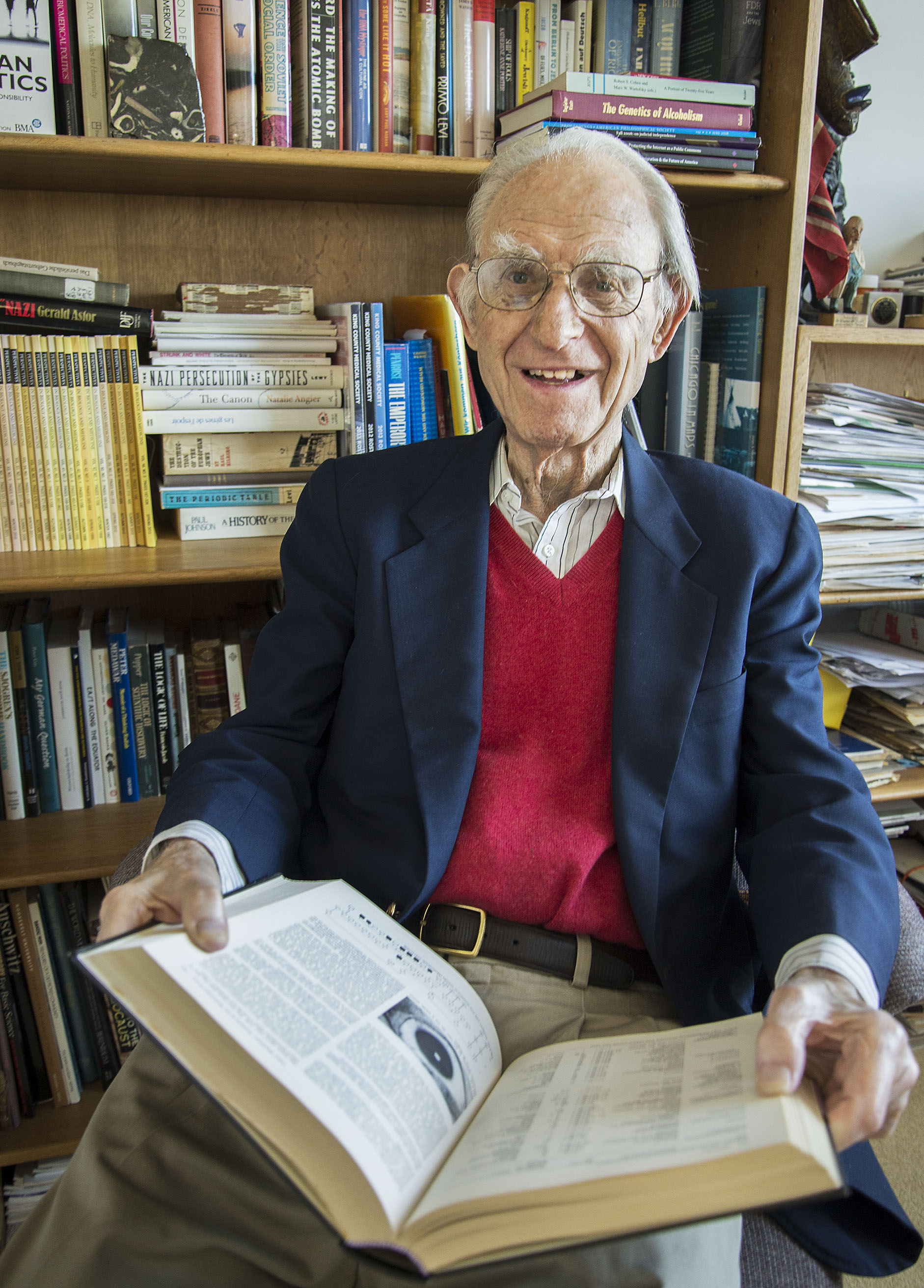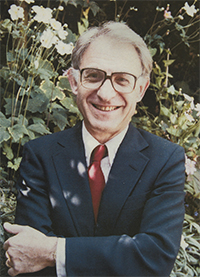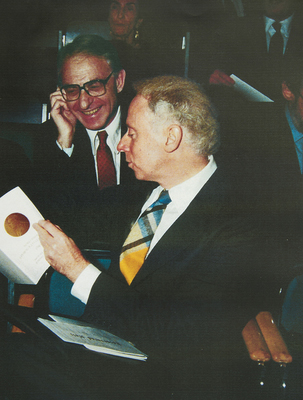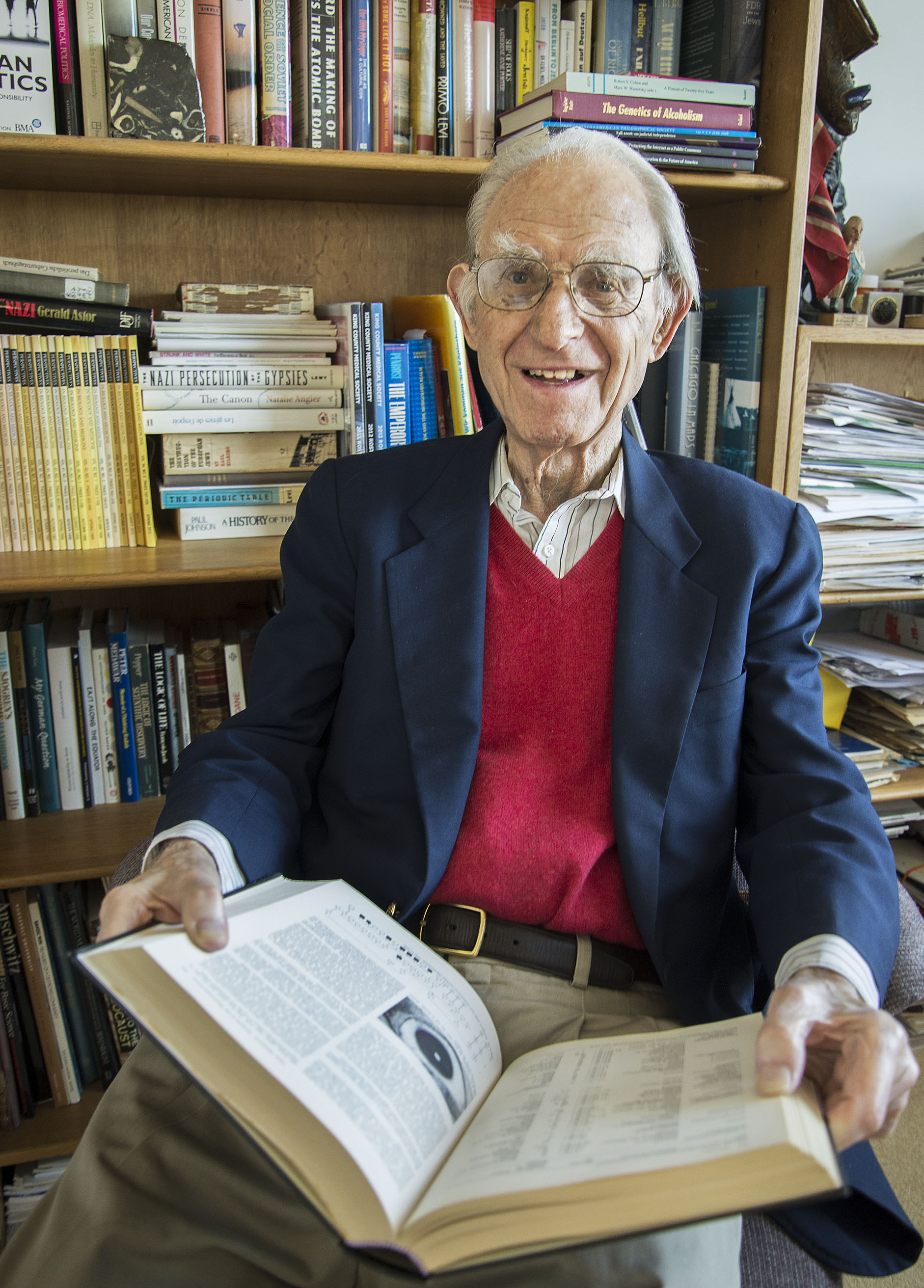
In memoriam: Arno Motulsky
Early years
In 1939, at age 16, Motulsky was among the Jewish passengers attempting to flee Germany on the MS St. Louis. The ship was denied entry to Cuba and turned away from the United States. It was forced to return to Europe, where the young Motulsky was arrested in Belgium, ironically, for being German.
After a series of transfers, he was sent to the Gurs internment camp in Vichy France. Unlike many, he did not die of starvation or cholera but survived to leave France in June of 1941, just ten days before his 18th birthday, when transit would have been impossible through Franco-controlled Spain.
Motulsky came to America, met his future wife Gretel, became an American citizen, and joined the U.S. Army. He attended Yale University as part of the Army’s program for rapid training of physicians, earning his M.D. at the University of Illinois in 1947.
He undertook residencies in medicine and hematology, studying hemoglobinopathies with Karl Singer at Michael Reese Hospital in Chicago, and red cell disorders affecting American troops at Walter Reed hospital during the Korean War.
Medical Genetics at the University of Washington

In 1953 Motulsky accepted a position in internal medicine at the University of Washington in Seattle and soon became known for his interest in teaching human genetics.
The chair of medicine asked him to found a Division of Medical Genetics, which opened in 1957 with Dr. Motulsky and Stanley Gartler, PhD, as the first faculty members.
Researcher
Pharmacogenetics
As the division grew, Motulsky worked both as a physician and scientist. He began to explore genetic reasons for differences in patients’ responses to drugs, developing the new field of pharmacogenetics and becoming known as the “father of pharmacogenetics.”
In this same period, he demonstrated, in mice, that bone marrow transplantation was a successful treatment for the red blood cell disorder spherocytosis.
During the 1960s, his interests broadened to encompass the global role of genetic variation in human disease and in genetics as a tool to understand biological processes. He recruited George Stamatoyannopoulos, M.D. to the division, and they worked together on the genetics of G6PD deficiency and population genetics of blood groups and other human variation.
Motulsky’s ever-expanding interests came to include the iron disorder hemochromatosis, associations of HLA antigens with disease, genetic linkage, interaction of genes and environment, hypertension, nutrition, alcoholism, color vision (with the late Samir Deeb), and pesticide metabolism (with Clement Furlong). He contributed importantly to national discussions of bioethical problems, including abortion.
Genetics of Jewish populations
The genetics of Jewish populations was a special area of interest. He studied and taught extensively about Jewish genetic diseases and their origins, first in 1979, with the publication of Genetic Diseases Among Ashkenazi Jews, edited with Richard Goodman. Into his 80s, he was much sought after as a speaker on the genetics of Jewish populations.
Mentor

In 1970, Joseph Goldstein arrived in Seattle as a medical fellow. Motulsky suggested to Goldstein that high cholesterol and lipid levels might be best understood through human genetics.
Together they published the landmark papers describing the transmission of hyperlipidemia in families. They proposed that very high cholesterol levels in these families might be due to a single gene. Goldstein made this project his life’s work.
In 1985, Motulsky watched proudly as Joe Goldstein and Mike Brown were awarded the Nobel Prize in Physiology or Medicine "for their discoveries concerning the regulation of cholesterol metabolism." Motulsky continued to work with lipids throughout his career.
Motulsky was a national model for mentoring, as described in Good Mentoring: Fostering Excellent Practice in Higher Education (Nakamura et al., 2009). The American Society of Human Genetics named its award in genetics education for him.
Teacher
Humble and approachable, Motulsky taught generations of medical geneticists. His textbook, Human Genetics: Problems And Approaches (commonly called “Vogel and Motulsky”) was initially co-authored with the late Friedrich Vogel and first released in 1979. It is the definitive textbook in human genetics and has had a great influence on the field internationally for 35 years. It has been translated into Italian, Japanese, Chinese, and Russian.
Leader
For six decades, Motulsky provided service and leadership in science policy and advocacy nationally and internationally.
He was a founding member of the Institute of Medicine (now the National Academy of Medicine) and served on Presidential Commissions, WHO Expert Advisory Panels, and National Research Council Committees.
He served on the President's Commission on Bioethics; National Research Council committees on nutrition, on genetic testing, and on gene therapy; the Science Council for Atomic Bomb Survivor Studies in Japan; the scientific advisory boards of the Howard Hughes and Markey Foundations; and advisory panels for World Health Organization.
Awards
His awards included election to the U.S. National Academy of Sciences and National Academy of Medicine, the American Philosophical Society, and the American Society for Clinical Investigation. He was awarded the Alexander von Humboldt Award and a Lifetime Achievement Award of American College of Medical Genetics. The American Society of Human Genetics honored him with all three of its most senior awards: the William Allen Memorial Award, the Excellence in Education Award, and the Victor A. McKusick Leadership Award.
Legacy

Into his 90s, Motulsky remained an active and productive presence at the University of Washington. In his last publication, he reflected on his life as a physician, scientist, and mentor, as “the adventure of an American geneticist.”
Throughout his 60-year career in genetics and medicine, he personified the physician-scientist-educator. His legacy extends into every area of modern human and medical genetics. His broad influence and humble leadership style reflected his genius and commitment.
"He was a brilliant scientist and our teacher, mentor, role model, and friend," said Dr. Gail Jarvik, Head, Division of Medical Genetics
Motulsky is survived by his children Judy Walker, Harvey Motulsky (Lisa Norton), and Arlene Audergon (Jean-Claude Audergon); six grandchildren (Collette, Jordan, Wendy, Nathan, Joey, and Ruby); and two great-grandchildren (Loretta and Vivian). Services have not yet been announced.
Written by Gail P. Jarvik, M.D., Ph.D.
Head, Division of Medical Genetics
The Arno G. Motulsky Endowed Chair in Medicine
Professor of Genome Sciences
Edited by Mary-Claire King, Ph.D.
Professor of Medicine and Genome Sciences